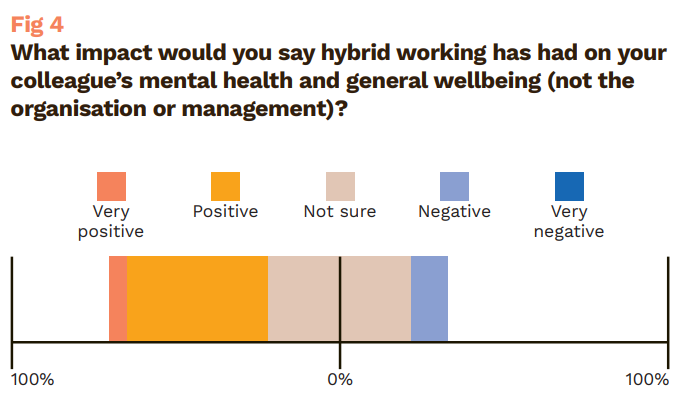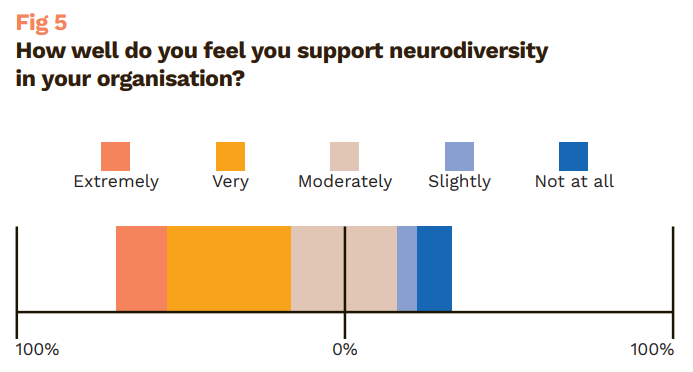23rd October 2023
In a quest to shed light on the current state of mental health and wellbeing in the workplace On Wellbeing conducted a comprehensive survey, garnering responses from over 120 HR professionals and those who’ve used corporate wellbeing programmes, across a spectrum of UK organisations, each representing diverse roles within their respective companies. The survey results cast a revealing spotlight on the relevance and effectiveness of workplace mental health programmes.
Uncovering the what, who, and when of effective wellbeing.
The pressing question is: what truly works in fostering workplace wellbeing, for whom, and precisely when does it make the most impact? As responsible stewards of employee health and wellness, we are compelled to address these questions with the urgency they deserve. Our goal is to create far-reaching, accessible wellbeing programmes that not only resonate with individuals but also ease the burden of stress and pressure in their daily lives. We must bridge the gap between having resources available and ensuring they genuinely reach the individuals they are intended for, instead of being lost in the digital abyss of a company’s intranet.
100% Impact: inside and outside the workplace
The survey’s standout revelation came in response to one pivotal question: how significantly did respondents believe poor mental health affected their colleagues, both at work and at home? The resounding answer – 100% – illustrates the pervasive impact of mental health on all facets of life (see Fig 1). This stark finding underscores the urgency of our mission; while awareness and provisions exist, they seem to fall short of their desired impact.
This discovery is particularly intriguing in light of subsequent responses. When asked about the effectiveness of existing mental health and wellbeing provisions (Fig 2), a majority expressed optimism about their programs. This juxtaposition prompts us to question whether perceived effectiveness translates into actual mental health improvements or if there’s a lag in implementation.
The complex landscape of employee departures.
Our exploration also delved into the reasons behind employee departures, revealing a mixed response regarding mental health as a factor. The dominant answer was ‘Sometimes,’ yet it’s essential to recognise that citing mental health as a reason for leaving a company can be a complex and sensitive issue. We must strive to develop more nuanced approaches to truly understand the multifaceted reasons behind resignations.
Hybrid working: a double-edged sword.
The shift to hybrid working (Fig 4) has sparked debate and division. Moving from traditional office-based work to remote settings has introduced a host of challenges. Early research indicated negative experiences, as individuals struggled to distinguish between work and personal life. Home became their workplace, social space, childcare centre, and gym all rolled into one. Although some thrive in this environment, others face issues like musculoskeletal problems, technostress, reduced socialisation, and diminished knowledge exchange. Responses on the impact of hybrid working on mental health mirror the uncertainty in research around the subject.
Closing the gap in neurodiversity support.
Our survey findings on neurodiversity support (Fig 5) signal that there is room for improvement. Many organisations are only beginning to explore effective strategies for supporting neurodivergent colleagues. Neurodiversity encompasses a range of cognitive differences, including autism spectrum disorder (ASD), ADHD, dyslexia and more. Proper support is critical, as individuals embracing neurodiversity often face elevated mental health challenges. By fostering self-advocacy and change, organisations can better serve up to 15% of neurodivergent employees in the UK.
What does a supportive neurodivergent workplace look like?
Microsoft, Deloitte and IBM have all set up neurodiversity programmes. A good set of starting points is:
• Seeking support from experts and ‘social partners’
• Managing career development with bespoke and clear goals
• Training managers in neurodiversity and mental health
• Creating support circles and encourage discussion
• Unbiassed hiring through task-based rather than interview-based approaches
Key insights and the way forward
Our survey captured valuable qualitative insights, highlighting challenges faced by leaders and colleagues alike. The struggle to secure commitment from upper management and the perception of mental health support as a mere ‘tick box exercise’ remain concerning, especially in light of the surging demand for mental health services.
Equally vital is our ability to reach those who need help but are reluctant to seek it—a question we posed at the outset. Companies often grapple with striking a balance between addressing employees’ needs and maintaining productivity, a challenge that has persisted since the emergence of workplace wellbeing as a key concept in the overall success of a company.
In conclusion, our survey has provided us with essential insights, challenging us to bridge the gap between awareness and effective action in the realm of corporate wellbeing. As we navigate the complex terrain of modern workplaces, our mission remains clear: to ensure that mental health, resilience and wellbeing are truly prioritised, not only in words but in meaningful and transformative actions.










